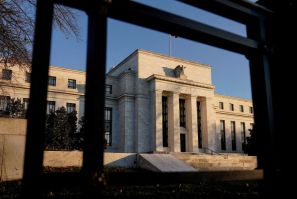U.S. stocks were set for a lower open on Thursday, a day after the Federal Reserve's less aggressive tone sparked a rally on Wall Street, with investors keeping an eye out for jobs data this week for more clues on future rate hikes.
U.S. stocks ended Thursday sharply lower amid a broad sell-off, as investor sentiment cratered in the face of concerns that the Federal Reserve's interest rate hike the previous day would not be enough to tame surging inflation.
Apollo Global Management Inc said on Thursday its first-quarter earnings jumped more than three times thanks to strong growth in income from management fees and profit from its retirement services business.
India's central bank is expected to frontload more aggressive interest rate hikes in its effort to tame high inflation, at least until its repo rate hits its pre-COVID level of 5.15%, economists said after a long-anticipated rate hike on Wednesday.
With more U.S. travelers expected to take to the skies and the roads this summer as COVID restrictions ease, unbridled demand will strain capacity in the leisure and travel industry and push prices even higher.
Norway's central bank kept interest rates on hold on Thursday as widely expected and restated its plan to raise the cost of borrowing in June amid rapidly rising inflation.
Germany took steps to ramp up liquefied natural gas (LNG) imports on Thursday as it moves away from piped Russian supply, renting four floating storage and regasification units (FSRUs) and choosing the North Sea port of Wilhelmshaven as the first handling hub.
Luxury British carmaker Bentley on Thursday said its first-quarter operating profit jumped 162% versus the same period last year, as soaring vehicle prices offset the loss of some cars at sea and pandemic-related delivery problems in China.
European stocks fell for the second straight session on Thursday, with most major sectors handing back earlier gains made after less hawkish comments from the Federal Reserve.
A U.S. Senate committee is expected to pass a bill on Thursday that could open members of the Organization of the Petroleum Exporting Countries and its partners to antitrust lawsuits for orchestrating supply cuts that raise global crude prices.
A U.S. Senate committee is expected to pass a bill on Thursday that could open members of the Organization of the Petroleum Exporting Countries and its partners to antitrust lawsuits for orchestrating supply cuts that raise global crude prices.
Tucked behind Doha's $300-million Lusail Boulevard, where construction workers are toiling to transform desert into a Champs-Elysees-inspired commercial thoroughfare before the 2022 soccer World Cup, sits a sole convenience store.
The U.S. dollar was nursing its losses at a one-week low on Thursday after the U.S.
The dollar hit a 20-year high against a basket of currencies on Thursday as a sharp stocks selloff boosted demand for the safe-haven currency and as the Federal Reserve was seen as tightening monetary policy more than peers.
The euro pulled back from a one-week high against the U.S.
Asian shares tracked Wall Street gains on Thursday after the U.S.
Asian shares tracked Wall Street gains on Thursday after the U.S.
Global equity markets were still on the charge on Thursday on relief that the biggest hike in U.S. interest rates in more than two decades hadn't been even sharper.
Global equity markets were still on the front foot on Thursday on relief that the biggest hike in U.S. interest rates in more than two decades hadn't been even sharper.
The Bank of England looks poised to raise interest rates on Thursday for the fourth time since December, the fastest increase in borrowing costs in a quarter of a century as it tries to quell the danger from the leap in inflation.
The Bank of England raised interest rates to their highest since 2009 on Thursday, hiking by a quarter-point to 1% to counter inflation now heading above 10%, even as it sent a warning that Britain risks falling into recession.
The Bank of England sent a stark warning that Britain risks a double-whammy of a recession and inflation above 10% as it raised interest rates on Thursday to their highest since 2009, hiking by quarter of a percentage point to 1%.
The Federal Reserve on Wednesday said it will start culling assets from its $9 trillion balance sheet in June and will do so at nearly twice the pace it did in its previous "quantitative tightening" exercise as it confronts inflation running at a four-decade high.
Nigeria expects to become an African hub for transshipment with a new deep seaport set to open in the commercial capital of Lagos before the end of this year, its managing director said on Wednesday.
EU countries and lawmakers will on Thursday kick off discussions on a European Commission plan targeting foreign state-backed buyers of European companies amid fears of a Chinese buying spree.
War may be raging on their doorstep but Central Europe's economies are outpacing their euro zone peers as consumer spending booms.
Canada's trade surplus with the world narrowed to C$2.49 billion in March from February, missing analyst expectations, as both imports and exports surged to record highs, data from Statistics Canada showed on Wednesday.
U.S. private employers hired the fewest workers in two years in April amid persistent labor shortages and increasing costs, which are hitting small businesses the hardest, raising the possibility that overall job growth slowed last month.
U.S. private employers hired the fewest workers in two years in April amid chronic labor shortages and rising costs, which are hitting small businesses the hardest, raising the possibility that overall job growth slowed considerably last month.
Nepal should engage in monetary tightening including rate hikes to contain dwindling forex reserves, without resorting to import curbs that could push up prices and hamper economic growth, a senior International Monetary Fund (IMF) official said.





































